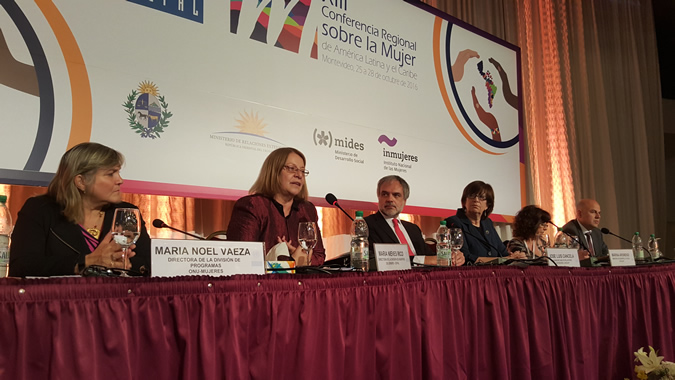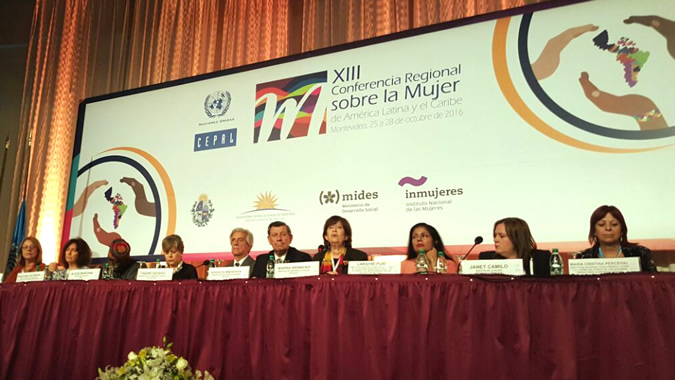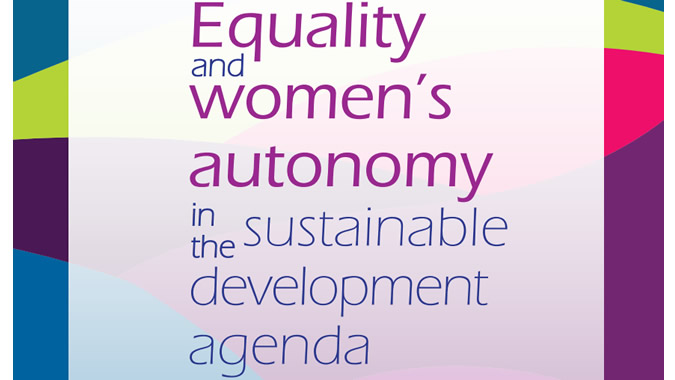Latin American and Caribbean Countries Approved the Montevideo Strategy to Achieve Gender Equality in the Region by 2030
Work area(s)
This is the principal outcome of the XIII Regional Conference on Women in Latin America and the Caribbean, organized by ECLAC this week in Uruguay.

Delegates from ECLAC’s 38 Member States and associate members approved today, at the conclusion of the XIII Regional Conference on Women in Latin America and the Caribbean held this week in Uruguay, the Montevideo Strategy to achieve gender equality in the region by 2030.
The Strategy sets out 74 measures for the 10 implementation pillars of the regional agenda on gender. This agenda encompasses all the commitments undertaken by the governments of Latin America and the Caribbean regarding women’s rights and autonomy, and on gender equality, since the first Regional Conference held in 1977 through the present.
The first five implementation pillars of the Strategy approved today are: Normative framework - equality and rule of law; Institutions - multidimensional and integrated policies of gender equality; Popular and citizen participation - democratization of policy and society; State capacity-building and –strengthening: public administration based on equality and non-discrimination; and Financing - mobilizing sufficient and sustainable resources for gender equality.
The other five pillars are: Communication - access to information and cultural exchange; Technology - toward e-government innovative and inclusive economies; Cooperation - toward democratic multilateral governance; Information systems - transforming data into information, information into knowledge and knowledge into political decisions; and Monitoring, evaluation and accountability: guaranteeing rights and transparency.
The resolution indicates that these pillars are interrelated and that putting them into effect will help establish sustainable sectorial and cross-cutting policies aimed at eliminating gender inequalities and guaranteeing the effective enjoyment of human rights by all women. They are, moreover, closely associated with the means of implementation of the 2030 Agenda for Sustainable Development, approved by the international community in September 2015.
The Montevideo Strategy is a regional agreement that the ECLAC Member States will adapt to their priorities, plans for gender equality and rights, sustainable development plans, and national policies and budgets.
Annually, the governments may voluntarily report on their progress in the application and adaptation of this political-technical instrument at one of the two meetings of the Presiding Officers of the Regional Conference on Women held each year, and at the regional conferences to come until 2030.
Furthermore, each year the Chair of the Regional Conference on Women, with the support of ECLAC’s Secretariat, will report to the Forum of the Countries of Latin America and the Caribbean on Sustainable Development on the progress made in the implementation of the Strategy. These reports will inform the global process in the framework of the High-Level Political Forum on Sustainable Development and the Economic and Social Council Forum on Financing for Development Follow-up.
“In order to achieve gender equality,” the countries assembled in Uruguay agreed, “it is necessary to overcome the structural challenges entrenched in the current unequal power relations in Latin American and the Caribbean.”
These include socioeconomic inequality and the persistence of poverty; discriminatory, violent and patriarchal cultural patterns and the predominance of a culture of privilege; sexual division of labor and unfair social organization of care; and the concentration of power and hierarchical relations in the public arena.
“These challenges exacerbate each other and generate complex socioeconomic, cultural and belief systems that hinder and reduce the scope of policies on gender equality and women’s autonomy. The Montevideo Strategy seeks to dismantle these structural challenges in order to make progress toward substantive equality.”
The Presiding Officers of the Regional Conference on Women is now formed by Uruguay as Chair, along with Argentina, Antigua and Barbuda, Brazil, Chile, Costa Rica, Cuba, the Dominican Republic, Ecuador, El Salvador, Honduras, Jamaica, Mexico, Panama, Puerto Rico, Saint Kitts and Nevis, Saint Vincent and the Grenadines, Saint Lucia and Suriname. The countries also agreed that the XIV Regional Conference on Women will be held in Santiago, Chile in 2019.
The conference in Montevideo was attended by 36 ECLAC Member States and two associate members, delegates from 12 agencies of the United Nations and 15 inter-governmental organizations, as well as members of 162 civil society organizations, academics and special guests.
More information:
For queries, contact:
ECLAC’s Public Information Unit.
Email: prensa@cepal.org; Telephone: (+56 2) 22 10 20 40.
Follow us on: Twitter, Facebook, Flickr, YouTube and Google+.
Related content

XIII Regional Conference on Women Opens with Strong Condemnation of Gender Violence in Latin America and the Caribbean
The President of Uruguay, Tabaré Vázquez, the Minister of Social Development, Marina Arismendi, and ECLAC’s Executive Secretary, Alicia Bárcena, led the opening session of the inter-governmental…

ECLAC Calls for Taking Innovative and Effective Measures to Guarantee Women’s Rights in Latin America and the Caribbean
In a new study released today, the regional organization details the enormous inequalities that are keeping women from exercising their physical, economic and political autonomy.
Country(ies)
- Latin America and the Caribbean
- Uruguay
